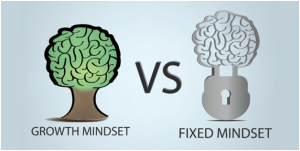Mindset refers to the collection of thoughts and beliefs that shape how we think, feel, and act. It essentially forms the lens through which we perceive the world and ourselves. A person’s mindset influences their habits, reactions to challenges, and their overall approach to life. Importantly, mindset plays a crucial role in how we cope with failures and setbacks. While some individuals might give up in the face of adversity, others embrace challenges as opportunities for growth. Studies have shown that our mindset is a powerful driving force that affects the way we lead our lives, impacting everything from our stress levels to our self-esteem.
The Two Types of Mindsets
Broadly speaking, people can be categorized into two types of mindsets: the growth mindset and the fixed mindset. Understanding these can provide insight into personal and professional development.
- Growth Mindset
- Fixed Mindset
Conversely, individuals with a fixed mindset believe that their basic qualities, such as intelligence, physical competence, and interpersonal skills, are static and unchangeable. They tend to view their attributes as innate and predetermined, leading them to avoid challenges and fear failure. This mindset can contribute to procrastination, low self-esteem, and a general resistance to change. People with a fixed mindset often strive for perfection and may struggle with stress and anxiety when faced with obstacles. They are more likely to have expectation incongruence—where their expectations do not align with their achievements—leading to frustration and self-doubt.
Shifting from a Fixed to a Growth Mindset
Transforming your mindset from fixed to growth can significantly impact your overall well-being and success. Here are some strategies:
Focus on Effort and Process
Instead of praising results, emphasize the effort and process. This approach encourages continuous learning and resilience. For instance, parents can foster a growth mindset in their children by acknowledging their efforts and dedication rather than just their achievements.
Embrace Challenges
Consider obstacles as chances for personal development rather than as dangers to your skills. By embracing difficulties, you can develop new skills and strengthen your ability to handle future obstacles.
Benefits of a Growth Mindset
Adopting a growth mindset can have profound effects on various aspects of your life:
- Stress Reduction: A growth mindset enables better handling of stress by viewing challenges as opportunities rather than threats. This perspective can lead to improved coping mechanisms and reduced anxiety.
- Enhanced Self-Esteem: Believing in your ability to grow and improve can boost your self-esteem and confidence. Acknowledging your progress and efforts fosters a positive self-image.
- Improved Physical Health: A growth mindset can lead to healthier lifestyle choices and better self-care. For instance, individuals may be more motivated to engage in regular exercise and healthy eating.
- Better Sleep: Addressing stress and adopting a growth mindset can contribute to better sleep quality. Reducing anxiety and fostering a positive outlook can lead to more restful and restorative sleep.
Integrating Mindset Transformation with Counseling
Counseling can be an effective way to identify issues related to mindset, gain insight, and build the confidence needed for personal growth. Professional guidance can help you address fixed mindset tendencies and develop strategies for cultivating a growth-oriented approach. Online counselling platforms like TalktoAngel connect individuals with the best psychologists in India, providing access to skilled therapists who can support mindset transformation.
Cognitive Behavioral Therapy (CBT) is one approach that can be particularly helpful. CBT focuses on identifying and changing negative thought patterns and behaviours, aligning well with efforts to shift from a fixed to a growth mindset. By questioning and rephrasing limiting beliefs, this therapy can help with a variety of problems, including eating disorders, OCD, depression, and anxiety.
Additionally, working with relationship counsellors or marriage counsellors can address interpersonal issues and enhance communication skills, contributing to a more resilient and growth-oriented mindset.
Conclusion
In conclusion, understanding and transforming your mindset is crucial for personal development and well-being. Whether you struggle with stress, depression, or anxiety, adopting a growth mindset can facilitate significant improvements in your life. By focusing on effort, embracing challenges, and utilizing professional counseling resources, you can foster a more positive and resilient approach to life’s obstacles.
TalktoAngel offers access to top psychologists in India, providing support for those seeking to enhance their mindset and overall quality of life. Embrace the power of mindset transformation to achieve greater self-improvement, resilience, and happiness in your personal and professional life.


